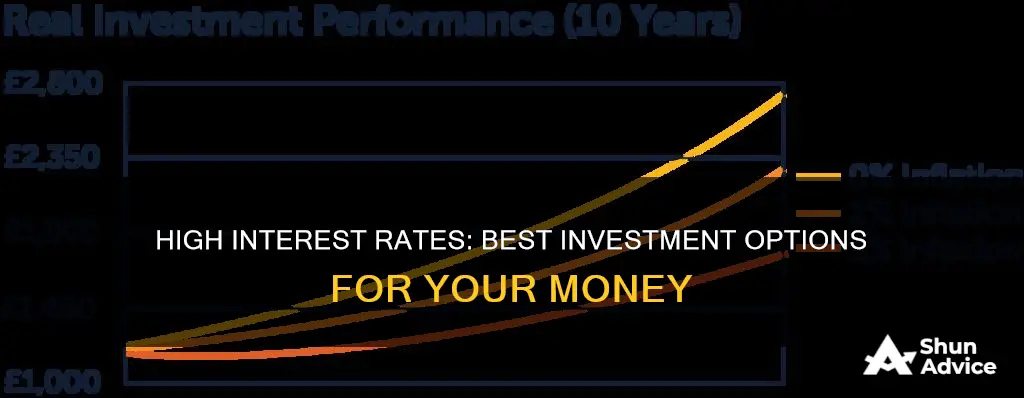
Interest rates are a key consideration for investors when crafting or readjusting their portfolios. While rising interest rates can negatively impact credit cards and other borrowing, they also present opportunities for investors to profit. For instance, investors can benefit from investing in banks and brokerage firms, as they earn more money from interest. Additionally, cash-rich companies, such as Apple, become more attractive as they earn more on their cash reserves.
Rising interest rates can also make certain assets, like bonds, more appealing to investors. During periods of high interest rates, investors tend to favour value stocks over growth stocks, as value stocks are less dependent on borrowing and are often more profitable in the immediate term. Dividend-paying stocks in sectors like consumer staples and healthcare can also be a good choice, as they offer immediate returns to investors.
Furthermore, investors may want to consider international opportunities, particularly in emerging markets, as rising interest rates can create a differential in currency, making US-based companies more attractive.
| Characteristics | Values |
|---|---|
| Investments | Banks and brokerage firms |
| Cash-rich companies | |
| Technology and healthcare stocks | |
| Companies with large cash balances | |
| Real estate | |
| Short-term and floating-rate bonds | |
| Payroll processing companies | |
| U.S. Treasury bonds | |
| Certificates of deposit | |
| Bank stocks and ETFs | |
| Growth stocks and ETFs | |
| Dividend-paying stocks | |
| Consumer staples | |
| Money market funds |
What You'll Learn

High-yield/junk bonds
High-yield bonds, also known as junk bonds, are corporate debt securities issued by companies with poor credit quality. They are characterised by their high interest rates, which compensate for the higher risk of default.
High-yield bonds are typically issued by startup companies or capital-intensive firms with high debt ratios. They can also be issued by companies that were once investment-grade but have since been downgraded, known as "fallen angels".
These bonds are considered non-investment grade, with credit ratings below BBB- from Standard & Poor's and Fitch, or below Baa3 from Moody's. The higher risk associated with high-yield bonds means that investors should have a higher risk tolerance when investing in them.
While high-yield bonds offer the potential for higher returns, they also carry greater risks, including default risk, higher volatility, interest rate risk, and liquidity risk. Default risk is the most significant concern, and investors typically deal with it through diversification.
When interest rates rise, the market value of high-yield bonds can decline as investors seek higher returns from newer bonds. However, rising interest rates can also benefit high-yield bonds, as they often coincide with economic expansion, which reduces the risk of default for the issuing corporations.
High-yield bonds are typically purchased either directly from broker-dealers or through a mutual fund or exchange-traded fund (ETF) that holds high-yield bonds. When considering investing in high-yield bonds, it is important to review the bond's prospectus and assess the financial health and credit rating of the issuing company.
Transferring Funds: Stash Invest to Spend
You may want to see also

Short-term investments
When interest rates are high, there are several short-term investment options to consider. Here are some detailed descriptions of each:
Savings Accounts
Savings accounts at banks offer flexibility and insurance from the Federal Deposit Insurance Corporation (FDIC). This insurance covers losses of up to $250,000 per person, per bank, and per account ownership category. Savings accounts are liquid, meaning you can access your money whenever needed. They are suitable for storing cash that you may require quick access to for emergencies or bill payments. However, the yields on savings accounts are sensitive to rate cuts and are likely to dip following reductions in the Fed rate.
Money Market Mutual Funds
Money market funds invest in short-term debt securities with low credit risk. There are three main categories: government, prime, and municipal. Government funds hold US Treasury and other government agency securities. Prime funds invest in corporate securities, while municipal funds focus on debt issued by states, cities, and public agencies. Money market funds offer easy access to your cash and are suitable for short-term needs or for holding cash to invest in future opportunities. While they are not insured by the FDIC, the Securities Investor Protection Corporation (SIPC) provides insurance for brokerage accounts holding money market funds, with a limit of $500,000 and a cash limit of $250,000.
Certificates of Deposit (CDs)
CDs are time-deposit accounts issued by banks with maturities ranging from one month to 20 years. When purchasing a CD, you agree to leave your money in the account for a specified period, during which the bank pays interest at a fixed rate. CDs may offer higher yields than some other short-term options, but early withdrawal typically incurs a penalty. One strategy to improve access to your funds and avoid penalties is to build a CD ladder, which involves staggering the maturities of multiple CDs.
Individual Short-Duration Bonds
Short-duration bonds include US Treasury, corporate, tax-free municipal, and taxable municipal bonds, offering varying levels of risk and maturity. These bonds carry slightly more credit and interest-rate risk than savings accounts, money markets, or CDs but potentially offer higher returns. They are suitable for those who don't need immediate access to their cash and can hold them until maturity.
Short-Duration Bond Funds
Bond funds may track an index or be actively managed by professionals. They do not have a maturity date, and their returns reflect the market prices of the underlying bonds. You can buy and sell bond funds daily, but their value can fluctuate with changes in bond prices.
Selecting Investment Funds: A Comprehensive Guide
You may want to see also

Real estate and housing
When interest rates are high, investors might be tempted to hold off on investing in property. However, investing in real estate can be a good idea, even in a rising rate environment. People will always need housing, and even if the market conditions aren't ideal, people will need to rent out a home or apartment.
When the Federal Reserve increases rates, properties get more expensive, decreasing demand from homebuyers. As a result, many interested homebuyers are priced out of the market and are no longer looking for properties. This means that investors will have less to choose from and may spend more on a home than they would in a lower-interest-rate environment.
However, a rise in mortgage rates also causes a rise in people looking to rent out homes because they have limited options. For savvy investors, this represents a potentially profitable opportunity.
Tips for Investing in Real Estate During High-Interest Times
- Consider a long-term strategy: Borrowing money becomes more expensive when the Fed raises rates, so the demand for rental homes and apartments will increase as many prospective homebuyers will struggle to qualify for a mortgage. A rental property in the right neighbourhood can be a great investment that can increase in value over time and help you hedge against inflation.
- Utilize Adjustable-Rate Mortgages (ARMs) and short-term loans: As a real estate investor, an ARM loan can be a great option if you want to secure a lower interest rate for a fixed period of time and gain some predictability with your payments. This is especially lucrative for investors with a short-term fix and flip strategy. You can also use an ARM loan towards a long-term strategy and refinance the loan for a fixed-rate mortgage once interest rates cool down.
- Increase your down payment amount: A higher down payment means less risk for the lender, which will help you secure a lower interest rate and avoid paying private mortgage insurance. This will lower your monthly payment and save you money in the long run.
- Set clear investment goals: It's important to have clear, wise investment goals to guide your day-to-day decisions. For example, if you want to maximize your profit in the short term, your investment strategy will be very different from building up a portfolio for retirement.
- Consult with experts: When interest rates are higher than usual, the margin for error is smaller. Seeking the expertise of qualified financial experts can be valuable in helping to steer your investment strategy and mitigate risks.
REITs
Real Estate Investment Trusts (REITs) are a way for investors to enhance the diversification of their portfolios. REITs are sensitive to interest rates and usually lead in the run-up to a first rate cut. REITs have been underperforming in recent years, but they may be poised for a comeback as interest rates fall.
Understanding AIFMD's Alternative Investment Fund Definition
You may want to see also

Preferred stocks
However, it is important to note that preferred stocks are riskier than bonds and usually have lower credit ratings. They are subject to interest-rate risk, meaning that their prices tend to fall when interest rates rise. Preferred stocks also carry call risk, as companies can redeem the shares when needed, especially when interest rates are low. Furthermore, preferred shareholders have limited voting rights and do not have a claim on residual profits, which may limit their potential for price appreciation.
When considering investing in preferred stocks, it is crucial to carefully evaluate the specific terms, features, and risks associated with each investment opportunity.
Launching an Investment Fund: A Guide for South Africa
You may want to see also

Money market funds
There are three main categories of money market funds: government, prime, and municipal. Government money market funds hold Treasury and other securities issued by the US government and government agencies. Prime retail money market funds do too, but they may also invest in securities issued by corporations. Municipal retail money market funds invest in debt issued by states, cities, and public agencies.
When deciding whether to invest in money market funds, it is essential to consider your specific liquidity requirements, investment horizon, risk tolerance, and return expectations.
Vanguard Funds: Best UK Investment Options
You may want to see also







